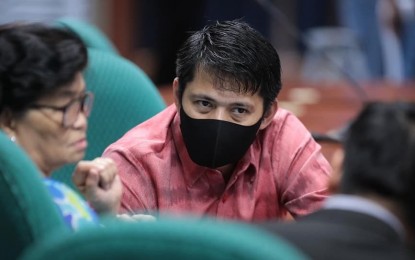
SERIOUS TALK. National Security Adviser Clarita Carlos (left) and Senator Robinhood Padilla confer during the Committee on Constitutional Amendments and Revision of Codes hearing on Friday (Sept. 2, 2022). The hearing is a continuation of discussions on proposals to revisit the 1987 Constitution. (Photo courtesy of Voltaire Domingo/Senate PRIB)
MANILA – Adopting a parliamentary form of government would be beneficial for the Philippines, Senate Minority Leader Aquilino “Koko” Pimentel III said during the continuation of the hybrid hearing of the Committee on Constitutional Amendments and Revision of Codes on Friday.
Unlike in a presidential system wherein the executive branch implements laws created by Congress, a parliamentary system merges the legislative and executive powers, he explained.
“Under a parliamentary form of government, the parliament determines the composition of the executive branch and its mission is to implement laws and programs authorized by the legislature,” Pimentel said. “Maybe now is the right time, especially with the fast-changing technology, science, and even economic policies and theories. So maybe we can react more quickly if we adopt a parliamentary system of government.”
Senator Francis Tolentino agreed that a government should go through periodic changes.
"I hope the discussion will be elevated nationally, to a level beyond partisan politics and even a discussion that should include the grassroots level," Tolentino said.
National Security Adviser Clarita Carlos said if change would be pursued, it should not be piecemeal revisions, which would be a waste of time.
“We are changing it (Constitution) because we want structural change. We want structural change because we want behavioral change,” Carlos said.
She said a parliamentary system would also be a chance to get rid of officials who cannot contribute to discussions.
“Because in the question hour, every member of the parliament will be asked what have you done in agriculture, what have you done in health services and the like, and will be made accountable for what he has or has not done,” she said.
Equal branches
Committee chair Senator Robinhood Padilla said a shift to parliamentary form would compel government officials to personally attend Senate hearings as he expressed dismay over the absence of some guests.
“Pantay tayo ng kapangyarihan. Kapag inimbita sana ang taga-executive sana po ay mapagbibigyan nyo kami. Itong bagay na ito ay hindi isang bagay na isinasantabi sapagka’t saligang batas po ito (We are co-equal. When we invite representatives of the executive department, we hope they would show up. This cannot be set aside because this is the Constitution)," Padilla said at the start of the hearing.
He also noted that the lack of coordination between the executive and legislative branches would not happen under a parliamentary system.
No-show
Department of Energy (DOE) Secretary Raphael Lotilla and his predecessor, Alfonso Cusi, did not attend the hearing.
In a letter, Lotilla told the committee that he would submit its comment to Resolution of Both Houses 1 in relation to the mandate of the DOE.
Pampanga 3rd District Rep. Aurelio Gonzales Jr. filed the measure on July 1, proposing that the terms of the President and Vice President terms be fixed at five years with one reelection, instead of the current six years without reelection.
The resolution also sought to change the three-year term of elected local officials, except village officials, to a five-year term subject to the limit of two consecutive five-year terms.
The resolution urges the Senate and the House of Representatives to convene into a Constituent Assembly.
Padilla said a sensitive topic like the constitution merits the interest of all stakeholders.
"Gusto natin bumalanse pero kung ganyan ang naabutan natin dito, mag-parliamentary na lang tayo. Wala na pong pag-uusapan dito kundi mag-parliamentary na tayo para harap-harapan tayo. Ang hirap nito sa taguan. Hindi ako sanay sa taguan (I want to make sure our hearings are balanced. We might as well shift to parliamentary so there won’t be hiding. I’m not used to hiding)," he said. (With a report from Leonel Abasola/PNA)
